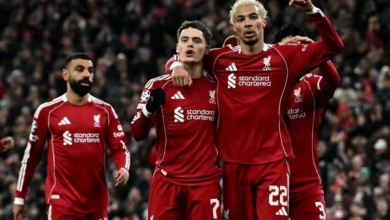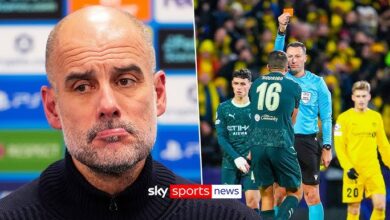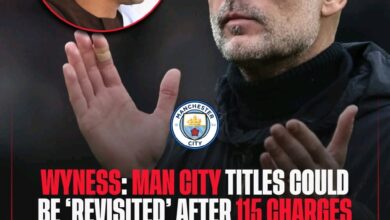Fabrizio Romano says Man City will finally complete the signing of Tottenham academy talent within 48 hours

In the ever-evolving landscape of modern football, the battle for young talent has become increasingly fierce, with elite clubs investing millions in their academies to unearth the next generation of superstars. Manchester City, under the meticulous guidance of Pep Guardiola, has established itself as one of the most progressive forces in youth development, and their latest acquisition exemplifies this commitment to nurturing future talent.
The Dexter Oliver Deal: A Month-Long Pursuit Reaches Its Conclusion
After a month of intensive negotiations that have captivated the football world, Manchester City have finally reached an agreement with Tottenham Hotspur for one of their most promising academy talents: Dexter Oliver. The respected transfer journalist Fabrizio Romano, whose “Here We Go” announcements have become synonymous with confirmed transfers, reported that the deal would be completed within 48 hours, marking another significant coup for City’s youth recruitment strategy.
The protracted nature of these negotiations underscores the value both clubs place on Oliver’s potential. For Tottenham, losing a promising academy prospect to a direct Premier League rival represents a significant blow to their own youth development ambitions. For Manchester City, securing Oliver’s signature represents another piece in their grand vision of creating a self-sustaining talent pipeline that can compete with the world’s elite.
Oliver’s imminent arrival at the Etihad Stadium coincides with what has been described as one of Manchester City’s most ambitious transfer windows in recent memory. Pep Guardiola entered the summer with clear intentions of adding four to five new players to his squad, a target that has already been achieved through a combination of first-team acquisitions and strategic youth investments.
The Broader Context of City’s Summer Transfer Activity
This summer’s recruitment drive at Manchester City has been characterized by both ambition and strategic planning. The club’s approach has been multifaceted, addressing immediate first-team needs while simultaneously investing in the future through carefully targeted academy acquisitions. This dual strategy reflects Guardiola’s understanding that sustainable success requires both present excellence and future preparation.
The coaching staff at City has also undergone significant changes, with several high-profile additions bringing fresh perspectives and expertise to the club. Kolo Toure, the former Arsenal and Liverpool defender, has been the latest addition to Guardiola’s coaching team, joining alongside Pepijn Lijnders and James French. This expansion of the coaching structure demonstrates City’s commitment to providing comprehensive support systems for both their first team and academy players.
Lijnders, in particular, brings invaluable experience from his time as Liverpool’s assistant manager under Jürgen Klopp, offering insights into different tactical approaches and player development methodologies. His presence could prove particularly beneficial for young players like Oliver, who will need expert guidance as they navigate the transition from youth football to potentially competing at the highest level.
Understanding Dexter Oliver: The Player Behind the Headlines
While specific details about Oliver’s playing style and technical attributes remain closely guarded, his status as one of Tottenham’s “brightest academy stars” suggests a player of exceptional potential. The midfielder’s development within Tottenham’s youth system, renowned for producing technically gifted players, indicates that he possesses the fundamental skills and tactical understanding necessary to thrive in elite football environments.
The fact that Manchester City were willing to engage in month-long negotiations for Oliver’s services speaks volumes about their assessment of his capabilities. City’s recruitment team, led by director of football Txiki Begiristain, has established a reputation for identifying and securing talented youngsters before they reach their peak market value. This approach has yielded significant dividends in recent years, with several academy graduates going on to achieve success both at City and elsewhere.
Oliver’s position as a midfielder makes him particularly valuable within City’s tactical framework. Guardiola’s system demands exceptional technical ability, tactical intelligence, and physical conditioning from his midfield players. The Spanish manager’s track record of developing young midfielders, from Thiago Alcantara at Barcelona to Phil Foden at City, suggests that Oliver will receive the highest quality coaching and development opportunities.
The Academy Arms Race: City’s Strategic Approach to Youth Recruitment
The signing of Oliver represents just one component of Manchester City’s comprehensive academy recruitment strategy for this summer. The club has identified several other promising targets, creating what essentially amounts to an academy arms race with other elite clubs. This systematic approach to youth acquisition reflects a broader understanding of the changing dynamics in football economics and player development.
Sverre Nypan from Norwegian club Rosenborg remains a priority target for City’s academy, with negotiations ongoing to secure the young talent’s services. The club’s interest in Scandinavian players reflects a broader trend in football, where clubs are increasingly looking to Nordic countries for technically gifted youngsters who can adapt to the physical demands of English football.
Kaylum Moss continues to be pursued from Liverpool, a move that would represent a significant coup given the historic rivalry between the two clubs. The potential acquisition of a promising talent from Liverpool’s academy would demonstrate City’s growing influence in the youth transfer market and their ability to attract players from traditionally successful youth systems.
Additionally, Aston Villa’s Freddie Lawrie is reportedly close to joining City’s youth ranks, further strengthening what is already considered one of the most talented academy intakes in recent memory. The convergence of these multiple signings suggests a coordinated strategy designed to create a golden generation of City academy players who can progress through the system together.
The Phil Foden Blueprint: Lessons from Success
The ultimate goal of Manchester City’s academy investment is to replicate the success story of Phil Foden, who has become the benchmark for what the club’s youth system can achieve. Foden’s journey from promising youngster to PFA Men’s Players’ Player of the Year in 2024 provides a template for how academy graduates can successfully transition to first-team football at the highest level.
Foden’s development under Guardiola has been characterized by patience, careful integration, and exposure to elite-level competition from an early age. His ability to adapt to different tactical roles while maintaining his natural creativity and technical excellence demonstrates the kind of versatility that modern football demands. For players like Oliver, Foden’s success story provides both inspiration and a practical roadmap for their own development.
The monetary value of developing a player like Foden cannot be overstated. While the exact figures remain confidential, industry estimates suggest that producing a homegrown player of Foden’s caliber represents a return on investment that far exceeds the costs associated with academy operations. This financial incentive, combined with the sporting benefits of having locally developed talent, makes academy investment an increasingly attractive proposition for elite clubs.
The Complex Legacy of Academy Graduates
While Foden represents the ideal outcome for City’s academy system, the stories of other graduates illustrate the complex nature of youth development in modern football. Cole Palmer’s move to Chelsea, for example, demonstrates how even successful academy products may find better opportunities elsewhere, despite the quality of their initial development.
Palmer’s subsequent success at Stamford Bridge has been remarkable, with many City fans acknowledging that his departure was ultimately beneficial for his career development. This mature perspective reflects an understanding that academy success cannot be measured solely by players who remain at their original clubs, but also by the overall quality of development provided.
Michael Olise, Morgan Rogers, and Brahim Diaz represent other examples of City academy graduates who have found success at the highest level of football. Their achievements across different clubs and leagues demonstrate the quality of coaching and development available within City’s youth system, even if they ultimately pursued their careers elsewhere.
The presence of these players competing at elite levels across European football serves as a powerful recruiting tool for City’s academy. Young players and their families can see concrete evidence that the club’s development system produces players capable of succeeding at the highest level, regardless of whether they remain at City or move elsewhere.
Tactical Integration and Development Philosophy
Guardiola’s approach to integrating academy players into his tactical system represents one of the most sophisticated youth development philosophies in modern football. The Spanish manager’s emphasis on technical excellence, tactical intelligence, and physical conditioning creates a demanding but rewarding environment for young players to develop their skills.
The integration process typically involves gradual exposure to first-team training sessions, followed by appearances in cup competitions and lower-stakes matches. This methodical approach allows young players to adapt to the intensity and complexity of elite football while maintaining their confidence and natural abilities.
For Oliver and other new academy arrivals, this integration process will be crucial to their long-term development. The ability to train alongside world-class players like Erling Haaland, Kevin De Bruyne, and Rodri provides invaluable learning opportunities that cannot be replicated in traditional academy environments.
The Financial Dynamics of Academy Investment
The economics of academy investment have evolved significantly in recent years, with Financial Fair Play regulations making the development of homegrown talent increasingly attractive from a financial perspective. Players developed through a club’s academy system are valued at zero in accounting terms, meaning their eventual sale or integration into the first team represents pure profit.
This financial incentive has led to increased investment in academy infrastructure, coaching staff, and recruitment networks. Manchester City’s approach represents one of the most comprehensive examples of this strategy, with the club investing heavily in facilities, coaching education, and global scouting networks to identify and develop the best young talent.
The potential return on investment for successful academy graduates is substantial. Industry analysts estimate that developing a player who becomes a regular first-team contributor can generate value equivalent to a transfer fee of £50-100 million, depending on their eventual impact and longevity.
Global Recruitment Networks and Scouting Innovation
Manchester City’s ability to identify and secure talents like Oliver reflects the sophistication of their global recruitment network. The club employs scouts across multiple continents, using advanced data analytics and video analysis to identify promising youngsters before they become widely known.
This systematic approach to talent identification has given City a competitive advantage in the youth transfer market. By identifying players at earlier stages of their development, the club can often secure their services at lower costs while providing comprehensive development support.
The integration of technology into scouting processes has revolutionized how clubs evaluate young talent. Advanced metrics, performance analysis, and predictive modeling allow clubs to make more informed decisions about which players to pursue and how to develop their skills most effectively.
The Psychological Aspects of Youth Development
The transition from academy football to professional environments presents significant psychological challenges for young players. The pressure, expectations, and lifestyle changes associated with elite football can be overwhelming for teenagers who are still developing their personal identities.
Manchester City’s approach to youth development includes comprehensive support systems designed to address these psychological challenges. Sports psychologists, educational support staff, and mentorship programs help young players navigate the complexities of professional football while maintaining their personal well-being.
For players like Oliver, who are moving between clubs during their formative years, these support systems become even more crucial. The ability to adapt to new environments, coaching styles, and expectations while maintaining performance levels requires exceptional mental resilience and professional support.
The Role of Competition in Development
One of the key factors in Manchester City’s academy success has been their ability to create competitive environments that simulate the pressures of professional football. The club’s academy teams compete in elite youth competitions, providing players with exposure to high-level competition from an early age.
This competitive environment serves multiple purposes: it allows coaches to assess players under pressure, provides motivation for continuous improvement, and helps identify those with the mental strength necessary for professional football. For new arrivals like Oliver, adapting to this competitive culture will be essential for their development.
The presence of multiple talented players in similar positions creates healthy competition that drives individual improvement while maintaining team cohesion. This balance between individual development and team success represents one of the most challenging aspects of academy management.
Future Implications and Long-term Vision
The signing of Dexter Oliver and other academy targets represents more than just individual player acquisitions; it reflects Manchester City’s long-term vision for sustainable success. By investing heavily in youth development, the club is positioning itself to remain competitive even as Financial Fair Play regulations become increasingly stringent.
This strategy also addresses the practical challenges of squad management in modern football. With limitations on squad sizes and increasing fixture congestion, having a pipeline of academy graduates who understand the club’s tactical systems and culture becomes increasingly valuable.
The success of this approach will ultimately be measured not just by the individual achievements of players like Oliver, but by the overall contribution of academy graduates to Manchester City’s sporting success over the coming decade.
Conclusion: Building Tomorrow’s Champions Today
The imminent completion of Dexter Oliver’s transfer to Manchester City represents far more than a simple youth acquisition; it symbolizes a comprehensive strategy designed to ensure the club’s continued success in an increasingly competitive football landscape. Through careful planning, substantial investment, and innovative development approaches, City is creating a foundation for sustained excellence that extends far beyond current first-team success.
The month-long negotiations required to secure Oliver’s signature demonstrate the value placed on exceptional young talent in modern football. As clubs across Europe recognize the importance of academy development, the competition for promising youngsters will only intensify, making early identification and recruitment increasingly crucial.
For Oliver himself, joining Manchester City’s academy represents an opportunity to develop under one of the world’s most successful coaches while training alongside some of football’s biggest stars. The pathway from academy graduate to first-team regular, as demonstrated by Phil Foden’s remarkable journey, provides a tangible example of what can be achieved through dedication, talent, and the right development environment.
As the football world continues to evolve, with increasing emphasis on financial sustainability and homegrown talent, Manchester City’s approach to academy development may well serve as a model for other elite clubs. The signing of Dexter Oliver, therefore, represents not just the acquisition of a promising young player, but another step in the ongoing revolution of youth development in modern football.
The next 48 hours will see the completion of this transfer, but the real story will unfold over the coming years as Oliver and his fellow academy arrivals begin their journey toward potentially becoming the next generation of Manchester City stars. In a sport where success is measured in trophies and titles, the investment in youth development represents a commitment to building not just winning teams, but a winning culture that can endure for decades to come.















